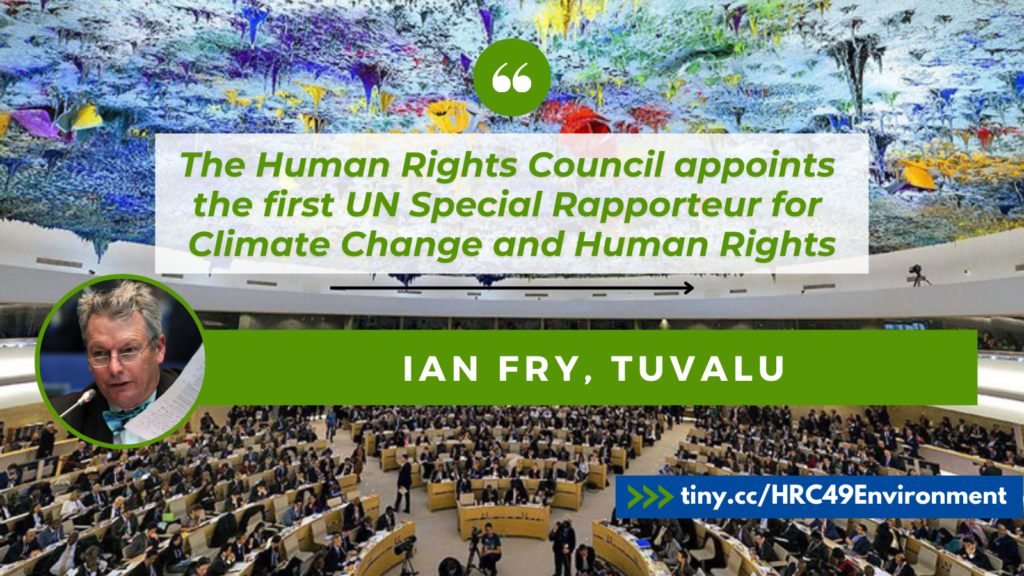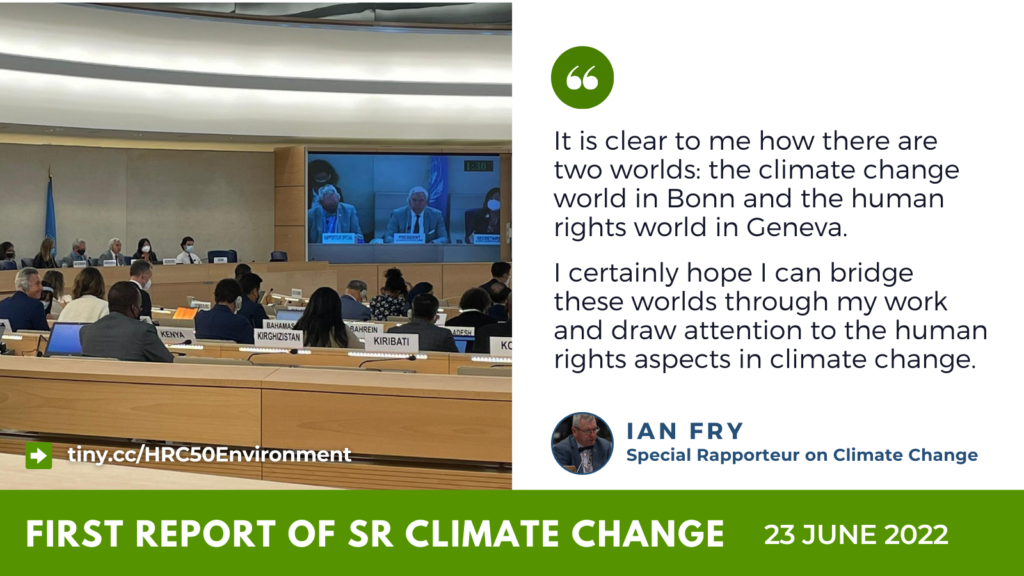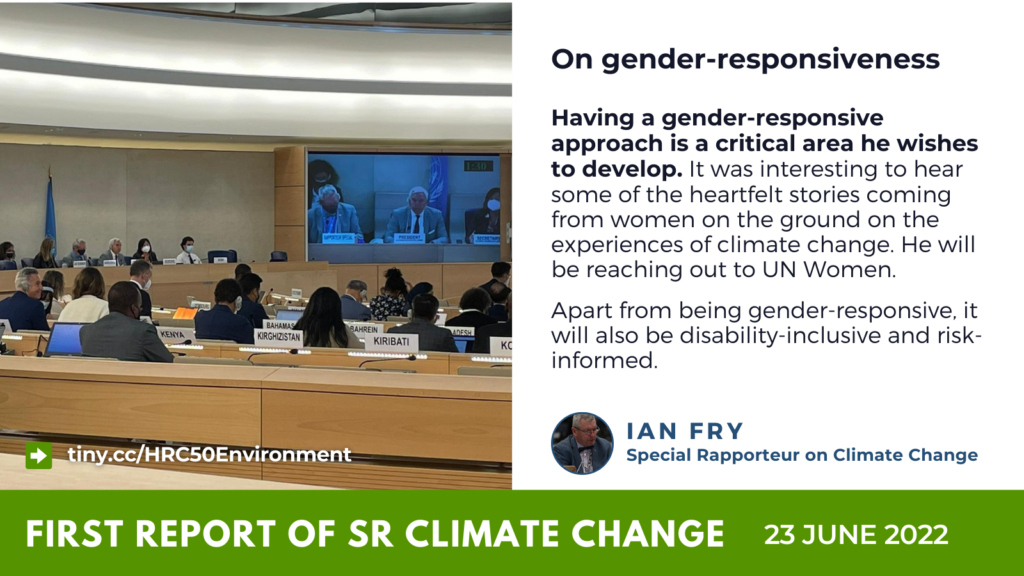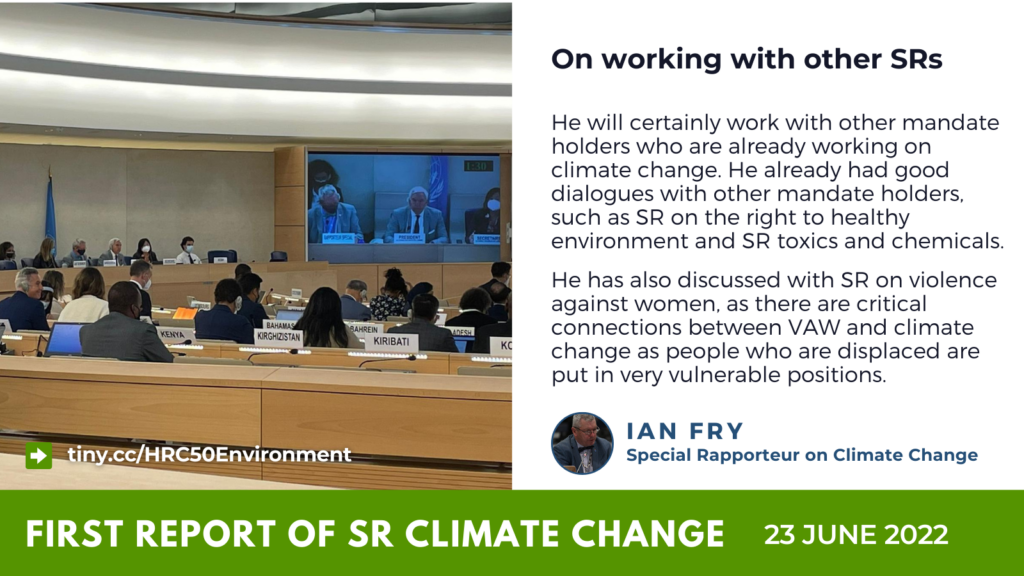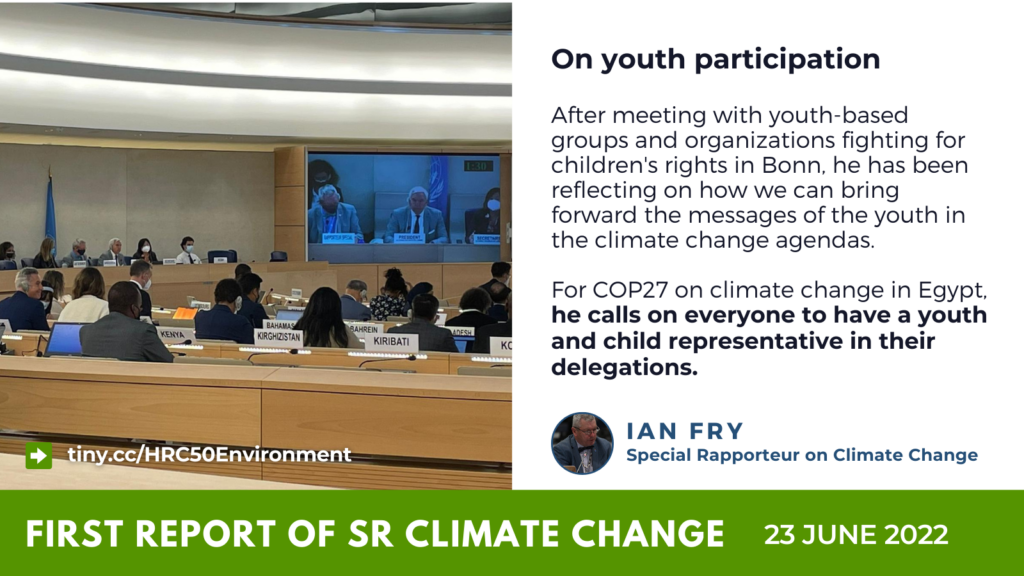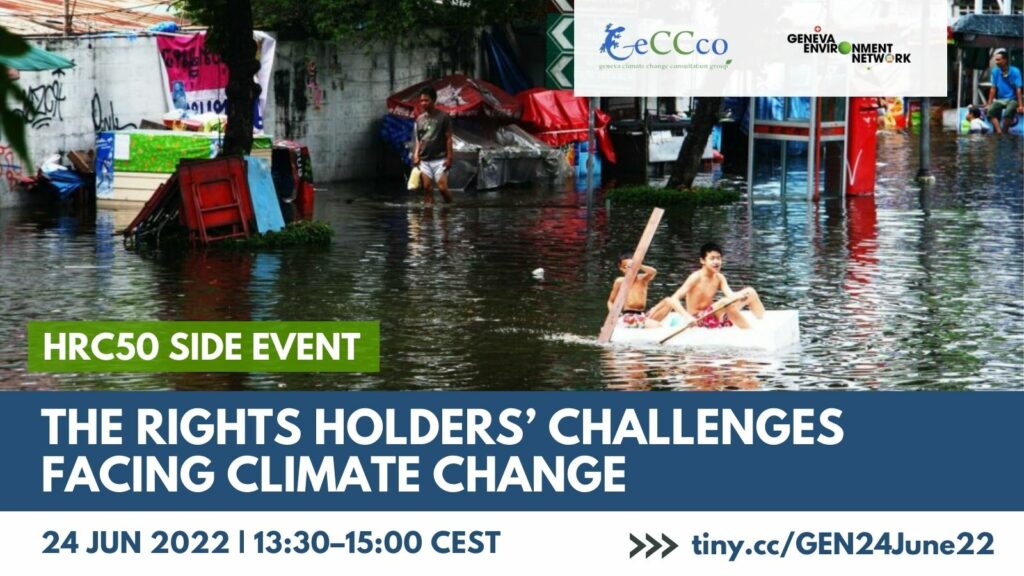Nouvelle
Environment @ 50th Session of the UN Human Rights Council
The 50th Regular Session of the Human Rights Council (HRC50) is taking place in Geneva and online from 13 June to 8 July 2022. This page highlights the environmental-related activities of this session. The page is regularly updated.
The Council proceedings can be followed live on UN TV. The meeting summaries will be available on the UN Geneva website and the live-updated programme of work on Sched.
Commemorating the 50th Session of the Council
In commemoration of the 50th session of the Human Rights Council, a High-Level event took place to provide stakeholders a platform to reflect upon and discuss the achievements and lessons learned in the past 49 sessions.
One of the achievements mentioned was the importance of the Council’s work on human rights in addressing unprecedented challenges, such as climate change, as highlighted by H.E. Abdulla Shahid, President of the 76th session of the UN General Assembly (UNGA).
I am encouraged by the adoption of two human rights resolutions on human rights and climate change last year. The resolutions identify and reaffirm the threats posed by climate change to the enjoyment of human rights. For countries like small-island states, they correspond to the right to life.
— H.E. Abdulla Shahid, President of the 76th session of the UN General Assembly
The UN Secretary-General António Guterres, also underscored in a video message how the Council, in the face of the climate crisis, can play a key role in a strengthened multilateralism:
Today, more than ever, we need a stronger multilateral system anchored in human rights in all its diversity and universality. That is a driving force for Our Common Agenda. This Council will play a critical role in making it a reality.
— UN Secretary-General António Guterres
To achieve this, both the UNGA President and the UN Secretary-General highlighted the importance of strengthening the links between Geneva and New York through greater collaborative and political will.
Climate Change and Human Rights
Climate change is an existential threat for people and the planet. Its harmful effects undermine the full enjoyment and realization of all human rights, disproportionately affecting those who are already in vulnerable situations. Over the past years, the Human Rights Council took on resolutions and discussions on specific aspects of climate change, while Special Rapporteurs (SR) contributed with reports on specific thematic angles within their mandates.
Mandate of SR on Human Rights and Climate Change
In its 49th Session, the Council has appointed Ian Fry (Tuvalu) as the first mandate holder of being the Special Rapporteur on the promotion and protection of human rights in the context of climate change for a period of three years. With respect to resolution 48/14, the mandate of the independent expert is to
… study and identify how the adverse effects of climate change, including sudden and slow onset disasters, affect the full and effective enjoyment of human rights and make recommendations on how to address and prevent these adverse effects.
First Report of SR Climate Change
As part of the Special Rapporteur’s mandate, the independent export presented his first report to the Council at this session (forthcoming link: A/HRC/50/39). An advanced unedited version of the report has been made available on the website.
The report has identified six thematic priorities that the Special Rapporteur will focus on during his mandate:
- The promotion and protection of human rights in the context of mitigation, adaptation, and financial actions to address climate change, with particular emphasis on loss and damage;
- Addressing the human rights implications of climate change displacement including legal protection of people displaced across international borders;
- Exploring approaches to enhance climate change legislation, supporting climate change litigation and advancing the principal of intergenerational justice;
- Corporate accountability with respect to human rights and climate change;
- The protection of human rights through just transition for workers in industries that contribute to climate change; and
- Exploring the impacts of new technologies associated with climate change mitigation on human rights.
Highlights
The independent expert presented his first report to the Council on 23 June 2022. Here are some highlights of the interactive dialogue from Twitter.
“We must provide lasting support for people impacted by #climatechange.”
In his report to the @UN Human Rights Council, Special Rapporteur Ian Fry (@SRclimatechange) outlined a six-point plan to address the human rights aspects of climate change https://t.co/1GczlJljPw#HRC50 https://t.co/bkYlY5iqdX pic.twitter.com/8xj7zODJGC
— United Nations Human Rights Council (@UN_HRC) June 23, 2022
Panel Discussion and Report: Human rights of people in vulnerable situations in the context of climate change
In reference to resolution 47/24, a panel discussion on the adverse impact of climate change on the full and effective enjoyment of human rights by people in vulnerable situations, took place on 28 June 2022. During the same panel, the Council also considered the Secretary-General’s report on the same issue (A/HRC/50/57).
Opening the panel, UN High Commissioner on Human Rights Michelle Bachelet highlighted how:
A safe and stable climate is an integral component of the right to a healthy environment, a right that was recognised by this Council in resolution 48/13.
— UN High Commissioner on Human Rights Michelle Bachelet
As various social and economic factors increase the risk of people in vulnerable situations, emission reductions and scaled up adaptation can only be fully effective when it integrates the perspectives of indigenous people, local and rural communities, peasants, migrants, children, women, and persons with disabilities.
The High Commissioner also “cannot overstate” the critical contributions of environmental human rights defenders, and underscored the need to better protect them. She stressed the important role of climate finance with a human rights-based approach, calling upon States to enhance international cooperation and assistance, in support of developing countries vulnerable to climate change.
Speaking at the panel, SR Ian Fry also highlighted a growing tide of people displaced by the impacts of climate change, calling it “an intolerable human rights tragedy, further compounded by different forms of discrimination, such as racism, sexism and classism.
He stressed the need to provide resources to support activities that focus on inclusive climate action, and emphasized on providing spaces for more meaningful participation of indigenous people, children and the youth.
After seeing “considerable pushback” from States in supporting a new financial facility for loss and damage, he strongly encouraged everyone to support this. He underscores that
Businesses must change. We need to develop a model of corporate that is far more responsible for the rights of everyone. Business accountability is one of these themes I will be considering in my mandate. If the corporate sector does not take urgent action and responsibility for growing greenhouse gas emissions more people will suffer.
— SR Climate Change, Ian Fry
HRC Resolution: Human Rights and Climate Change
In its 50th session, the Human Rights Council adopted without a vote a resolution (A/HRC/50/L.10/Rev.1) on Human rights and climate change. The resolution urges States that have not yet ratified the Paris Agreement to do so, and calling upon all to adopt a comprehensive, integrated, gender-responsive, age-inclusive and disability-inclusive approach to climate change adaptation and mitigation policies.
The resolution also highlighted the importance for all countries of averting, minimizing and addressing loss and damage associated with the adverse effects of climate change, including extreme weather events and slow-onset events, and the role of sustainable development in reducing the risk of loss and damage.
Other outcomes include a panel discussion focusing on the adverse impact of climate change on the full realization of the right to food for all people during the 53rd session.
Side Events
SR climate and numerous stakeholders working at the forefront of climate change and human rights in Geneva and abroad spoke in various side events on how we can better address climate justice and achieve the results needed in the upcoming climate negotiations.
- Geneva Climate Change Consultation Group (GeCCco) and the Geneva Environment Network side event “The Rights Holders’ Challenges Facing Climate Change” with SR Climate and other leading experts to exchange on the importance of protecting the rights of people affected by climate change. → Summary and video are available on our page.
- GeCCco and partners hosted two additional side-events dealing specifically with climate change induced displacement (22 June) and a just green transition (23 June)
Business and Human Rights
Human rights and the environment are intrinsically intertwined. If we are to tackle environmental challenges without leaving anyone behind, the private sector must respect both the environment and environmental rights, and ensure they are not violated in their conduct of business operations and beyond.
Working Group on Business and Human Rights
The Council considered various reports of the Working Group on the issue of human rights and transnational corporations and other business enterprises. This includes a report on the “Tenth anniversary of the Guiding Principles on Business and Human Rights (UNGPs): a roadmap for the next decade of business and human rights – raising the ambition, increasing the pace” (A/HRC/50/40/Add.3).
In the tenth anniversary of the unanimous endorsement by the Council of the UNGPs in July 2021, the Working Group took stock of the first decade of its implementation. The stocktaking is followed by a report — “UNGPs 10+ Roadmap for the next decade“– that sets out eight key action areas for the road ahead and for progressively getting closer to fuller UNGPs realization in the next ten years.
ISHR and other stakeholders are urging all States to make a commitment to the systematic monitoring of attacks on indigenous, land and environmental defenders in their countries, and to take stronger action, together with civil society and relevant UN Special Procedures, to address the root causes of attacks
Women’s Human Rights and Gender Equality
The importance of gender equality for a sustainable future has been established in SDG 5 – Achieve gender equality and empower all women and girls. However, it is not a stand-alone objective; rather, gender equality is important for the achievement of other global goals, including those related to environmental challenges and the full realization of human rights.
Report: Girls’ and young women’s activism
The Human Rights Council considered the report of the Working Group on discrimination against women and girls regarding the important contributions made by girls and young women from different regions and backgrounds (A/HRC/50/25). The report highlighted their contribution to the promotion of gender equality and the advancement of human rights, along with the profound transformative potential of their activism, as seen in local to international movements in environmental justice to climate action engaged by girls and young women.
Report: Violence against indigenous women and girls
Pursuant to HRC resolution 41/17, the Council also considered the report of the Special Rapporteur on violence against women, its causes and consequences, Reem Alsalem, on causes, manifestations and consequences of gender-based violence against indigenous women and girls (A/HRC/50/26).
The independent expert particularly highlights the gender-based violence that arises from the climate crisis and environmental degradation:
Indigenous women and girls are additionally specifically affected by the climate crisis, environmental degradation, industrial-scale agriculture and extractive industries and projects, and face an elevated risk of health problems, including reproductive health problems and high infant mortality rates associated with environmental contamination and degradation, leading to the loss of their traditional and spiritual ways of life, affecting their cultural identity and livelihood, and pulling them into a cycle of impoverishment and exposure to gender-based violence.
— SR on violence against women Reem Alsalem
In the dialogue that took place on 20 June 2022, the Special Rapporteur highlighted that as the nexus among gender, justice and the climate crisis is being explored more, the first report of the independent expert in October to the Council will be an attempt to further this collective understanding of this relationship. Several members of the Council have also highlighted the intersectional aspects of violence, particularly those of environmental human rights defenders, raises the risks faced by indigenous women and girls.
Annual Full-Day Discussion on the Human Rights of Women | Panel 1: Exploring the nexus between climate change and violence against women and girls through a human rights lens
Pursuant to resolution 6/30, the the first panel of the 2022 annual discussion on the human rights of women explored the interlinkages between climate change and violence against women and girls through a human rights lens. It aimed to increase awareness of the human rights framework applicable to such a nexus, and discussed challenges and promising practices in this regard.
In an opening statement by UN High Commissioner Michelle Bachelet, she highlights that though climate change threatens us all, “it is women and girls who often suffer its harshest and most violent consequences,” as violence against them is exacerbated by the climate crisis.
As we strive today to look at this issue with a human rights lens, we need to ensure that climate change policies and approaches place the human rights of women and girls front and centre.
— Michelle Bachelet, UN High Commissioner for Human Rights
In order to leave no one behind, she highlights five urgent steps that we must take:
- Recognition and acknowledgement that climate change and violence against women are linked;
- Equal, full and effective participation and leadership of women on climate issues;
- Strengthening the design and effective implementation of gender-responsive environmental and disaster risk reduction policies, programmes and budgets by States;
- Enhancing accountability frameworks; and
- Taking urgent steps to respect, protect and fulfil their human rights obligations to women and girls, and in particular women environmental human rights defenders.
Other Themes
Report: Trafficking in persons in the agriculture sector
Pursuant to resolution 44/4, Special Rapporteur on trafficking in persons, especially women and children, Siobhán Mullally, provides a report on the high levels of informality, lack of oversight and protection, trafficking in persons causing serious concern within the agricultural sector (A/HRC/50/33).
Agriculture, and specifically intensive agriculture, is contributing negatively to climate change, reflecting the wider nexus between trafficking in persons, environmental degradation, loss of biodiversity and the climate crisis. The report highlighted the importance of mandatory human rights and environment due diligence measures to combat trafficking in persons within the agriculture sector to achieve the goals of sustainable development.
Report: Panel discussion on the rights of indigenous peoples
The Council will have before it the report of Office of the United Nations High Commissioner for Human Rights on the panel discussion on the rights of indigenous peoples held at the forty-eighth session (A/HRC/50/48). Providing a summary of the proceedings of the annual half-day panel discussion on the rights of indigenous peoples, the report highlights the increase in violence in environmental and indigenous human rights defenders.
Report: Panel discussion on the human rights of migrants in vulnerable situations
The Council will have before it the OHCHR report on the intersessional panel discussion on the experiences and rights of migrants in vulnerable situations (A/HRC/50/52). Providing a summary of the proceedings of the annual half-day panel discussion, the report points out that the adverse impacts of climate change and environmental degradation were highlighted as significant drivers of migration.
The extension of the mandate of the Special Rapporteur on the human rights of internally displaced persons (A/HRC/50/L.4) also incorporates the need for a human rights-based and gender-responsive approach in tackling the adverse effects of disasters including climate change on the internally-displaced.
Events
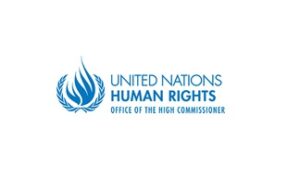
Interactive dialogue with WG on discrimination against women
17 June 2022, 10:45-13:00 & 15:00-15:45 CEST

Interactive dialogue with SR on violence against women
20 June 2022, 10:20-13:15 CEST

Interactive dialogue with SR on trafficking
21 June 2022, 12:00-13:00 CEST & 22 June, 12:00-13:00 CEST
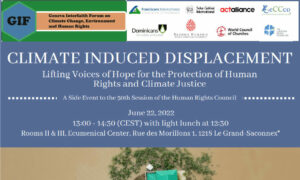
Climate Change Induced Displacement | HRC50 Side Event
22 June 2022, 13:00-14:30 CEST | Geneva Interfaith Forum & GeCCco | In-person & Online

Interactive dialogue with WG on transnational corporations and other business enterprises
22 June, 15:00-16:30 CEST
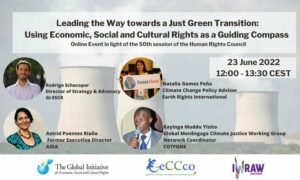
Leading the Way towards a Just Green Transition: Using Economic, Social and Cultural Rights as a Guiding Compass | HRC50 Side Event
23 June 2022, 12:00 – 13:30 | GI-ESCR | GeCCCo & IWRAW-AP | Online

Interactive dialogue with SR Climate
23 June, 15:00-18:00 CEST

The Rights Holders’ Challenges Facing Climate Change | HRC50 Side Event
24 June, 13:30-15:00 CEST | GeCCco & GEN | Online
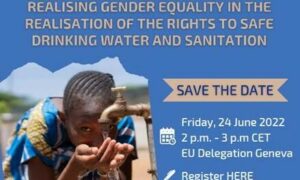
Realising gender equality in the realisation of the rights to safe drinking water and sanitation | HRC50 Side Event
24 June 2022, 14:00-15:00 CEST | EU Delegation to the UN in Geneva | Rue du Grand Pré 66
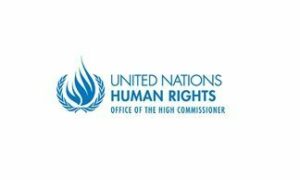


HRC50 Side Event | Economic, social, and environmental rights in Chile’s constitutional process
28 June 2022, 15:00-16:00 CEST | GI-ESCR, Geneva Academy
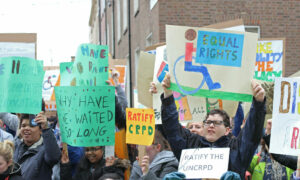
Climate Change and Persons with Disabilities: How to ensure equal participation, full realization and enjoyment of human rights?
1 July 2022, 13:15-14:45 CEST | Permanent Mission of Lithuania, et. al. | In-person and Online | Zoom
Reports
- A/HRC/50/25 | Girls’ and young women’s activism
- A/HRC/50/26 | Violence against indigenous women and girls
- A/HRC/50/33 | Trafficking in persons in the agriculture sector: human rights due diligence and sustainable development
- A/HRC/50/39 | Report of the Special Rapporteur on the promotion and protection of human rights in the context of climate change (forthcoming)
- Advanced unedited version of the report (English)
- A/HRC/50/40 | The coronavirus disease pandemic: lessons learned and moving forward
- A/HRC/50/40/Add.3 | Tenth anniversary of the Guiding Principles on Business and Human Rights: a roadmap for the next decade of business and human rights – raising the ambition, increasing the pace”
- A/HRC/50/48 | Panel discussion on the rights of indigenous peoples
- A/HRC/50/52 | Summary of the intersessional panel discussion on the human rights of migrants in vulnerable situations
- A/HRC/50/57 | The impacts of climate change on the human rights of people in vulnerable situations – Report of the Secretary-General
Resolutions
- A/HRC/50/L.10/Rev.1 | Human Rights and Climate Change | Bangladesh, Philippines, Viet Nam
Call for Submissions
Special Procedures
The special procedure mandate-holders are independent human rights experts who help advance human rights, by reporting and advancing from a country-specific or thematic perspective, some of which are related to the environment. Calls for submissions are made to help mandate-holders prepare their reports to the Human Rights Council.
Links and Resources
- 50th session of the UN Human Rights Council
- GCHRAGD | Updates on HRC50
- ISHR | HRC50 | Key issues on agenda
- URG | Inside Track: HRC50
- GEN | Human Rights and the Environment
News
- UN General Assembly must affirm right to healthy environment: UN experts | 6 July 2022
Various UN Special Rapporteurs had urged the UN General Assembly to recognize that living in a clean, healthy and sustainable environment is a fundamental human right, in light of the upcoming 77th session in New York, where the resolution is expected to be adopted. - NGOs call on UN Secretary-General to hold transparent, merit-based, consultative process to pick next UN High-Commissioner | 22 June 2022
In an open letter to the UN Secretary-General, NGOs, including environmental organizations based in Geneva, insist that the post of High Commissioner should be filled by someone of high moral standing and personal integrity, and who is independent and impartial and possesses competency and expertise in the field of human rights.
Past HRC Sessions
Environment @ HRC49 | Environment @ HRC48 | Environment @ HRC47 | Environment @ HRC46 | Environment @ HRC45 | Environment @ HRC44 | Environment @ HRC43
Who to Follow on Twitter
@UN_HRC | UN Human Rights Council
@FVillegasARG | H.E. Amb. Federico Villegas, Permanent Representative of Argentina to the United Nations Office at Geneva, President of the Human Rights Council in 2022
@UNHumanRights | The Office of the High Commissioner for Human Rights (UN Human Rights)
@mbachelet | United Nations High Commissioner for Human Rights
@SRclimatechange | Ian Fry, SR human rights & climate change
@ISHRglobal | The International Service for Human Rights
@FranciscansIntl | Franciscans International
@Geneva_Academy | Geneva Academy of International Humanitarian Law and Human Rights
@hrw | Human Rights Watch
@URGthinktank | Universal Rights Group (URG)
@YvesLador | Special Representative of Earthjustice in Geneva
@duycks | Senior Attorney – Climate and Energy Programme at the Center for International Environmental Law
@katha_nina | Katharina Rall, Senior environment researcher at HumanRights Watch
@ChildRightsCnct | Child Rights Connect
@CERI_Coalition | Children’s Environmental Rights Initiative (CERI)
@CRINwire | Child Rights International Network


